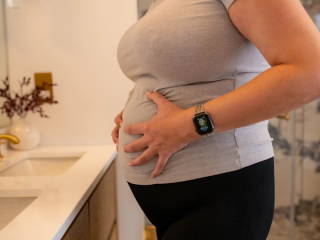
- Home
- Advice Hub
- Pregnancy
- Pregnancy Symptoms & Issues
- Coping With Pregnancy Anxiety
Coping with Pregnancy Anxiety and Perinatal Mental Health
Read our expert guide on managing pregnancy anxiety and perinatal mental health, with tips and support for expecting parents.
The perinatal period refers to the time you start your pregnancy all the way up to the first year after giving birth. There are a number of significant changes to our well-being during this time and there can be an entire range of feelings from when you think you may be pregnant, to confirming this and to the duration of growing your baby to term.
Both expected and unexpected pregnancies cause us to consider the future, important decisions and in turn these can add strain in relationships or worries about finances. It is important to remember that feeling overwhelmed in pregnancy is very normal and there should be no shame or guilt around these feelings. It’s normal to have increased anxiety about the changes going on around you and to you. Talking about these open and honestly is first step to ensuring you look after your mental health and your baby
What causes pregnancy anxiety?
Despite pregnancy being a time of joy and excitement there can also be times of stress in pregnancy. Anxiety in pregnancy is more common than you may think and around 1 in 5 pregnant women experience this. Pregnancy brings lots of changes both physically and mentally as you get ready to have your baby. You may notice an increase to how anxious you were before pregnancy. There are many questions you may be considering or asking yourself about the future and alongside these questions your body is going through lots of hormonal changes.
What are signs of pregnancy anxiety?
While experiencing some levels of anxiety is normal, if you are finding it hard to manage your worries day to day, you could be experiencing a higher level of anxiety and need support.
Signs you may need support could look or feel like:
- A constant feeling of dread
- Feeling very on edge or nervous
- Not feeling in control of your emotions
- Feeling restless
- Finding it difficult to focus
- Feeling overly worried about your baby
- Having trouble sleeping
You could also find yourself experiencing more serious symptoms such as
- A fear of dying
- Chest pains
- Feeling dizzy
- Finding it hard to breathe
- Feeling faint
- Increased heart rate
If you are having episodes where you notice these symptoms you could be experiencing panic attacks. It is very important for your long term mental health you seek help and support immediately.
What are the effects of anxiety on the baby?
Abnormal levels of stress and anxiety are not good for you or your baby, but focusing on this will likely cause you to feel worse. Prioritising getting help and support is the best step you can take to look after yourself and your baby. Focus your attention on ways you can reduce your stress levels, what the best methods of support look like for you and how to access them. It is important to firmly remind yourself you do not need to feel guilty and that these feelings are common.
How to treat pregnancy anxiety
Pregnancy is a huge change to your body both emotionally and physically, it is important to keep reminding yourself of this fact and be kind to yourself. If you are experiencing anxiety which is more than usual, for example:
- Feeling anxious most of the time
- Intrusive thoughts
- Obsessive tendencies
- Intense fear of giving birth
- Signs of a panic attack
Please seek support from your GP or midwife, they will know how best to support you. You do not need to be ashamed about discussing these feelings, healthcare professionals will be prepared with some good strategies and suggestions which can help you. The strategies they give will depend on your mental health history and the severity of what you are experiencing, but sign posting to professionals is the first step to feeling better.
There are ways you can help to reduce the stress you may be feeling, and these can be implemented by yourself from home:
- Regular physical activity: Moving your body will firstly help with pregnancy discomforts and help you feel more energised. It will also reduce your cortisol levels which will increase your mood. Regular exercise will also promote better sleep, which can have a huge impact on how we feel.
- Get plenty of sleep: Sleep helps to balance all of our hormone levels, which can make a huge difference when we are feeling stressed. Quality rest also gives us some time to gain clarity in turn this can reduce the feeling of overwhelm.
- Mindfulness: Taking time to yourself during pregnancy to collect your thoughts and consider how you feel can be really beneficial, this can be through practices such as mindfulness activities and pregnancy yoga. Yoga is also a great way to strengthen your mind and body for labour.
- Meditation: Relaxation activities such as meditation help you to recognise how your body feels and what you need to feel better. It also improves blood flow as you relax, which is such a wonderful feeling as this will help with the development of your baby and reduce impacts of stress on your pregnancy.
Pregnancy is a rollercoaster of emotions, often bringing unexpected feelings that take us by surprise. The mix of emotions can lead to significant highs and lows, but staying present and reminding ourselves that feelings are temporary can be grounding.
Healthcare professionals are there to support us not only with our physical health but also with perinatal mental health. Reaching out for support is always the best thing we can do.
If you or someone you know is experiencing the signs of stress and anxiety discussed in this article, please don’t hesitate to seek support.
Remember we can’t pour from an empty cup, be kind to yourself.
FAQ’s around pregnancy and anxiety
Anxiety can be caused for a number of reasons, which in some cases are hard to identify the route cause. During pregnancy we are experiencing a lot of unknowns, alongside hormonal changes, this is why it is normal to have increased anxiety during this time.
Symptoms of anxiety look different for everyone, these can include physical symptoms such as trouble sleeping, increased heart rate and irritability, but they may also look like difficulty sleeping and restlessness.
Stress and anxiety are not good for you or your baby, but focusing on this can make us feel worse. The best action we can always take is to seek help from a healthcare professional such as a GP or midwife.
Yes, it is very common around 1 in 5 women experience anxiety during pregnancy.
Managing perinatal mental health can be tackled in lots of ways. Self-care and relaxation techniques are the first step you can take for yourself. Talking to your GP or midwife will also provide you with strategies you can implement to look after your perinatal mental health.












